How the war split the mafia | NYC considers facial recognition ban for businesses, landlords | Firefighters take on four-alarm blaze at Brooklyn catering hall | Ex-FBI supervisor accused of encouraging Jan. 6 mob to ‘kill’ police | "Brooklyn Ballet" - Google News: 8 Performances We've Got Our Eyes on This Month - Dance Magazine

Read more of our recent coverage of the Ukraine war
Aleksandr otdelnov owns an unusual tourist attraction: a smuggling museum. Contraband has been flowing through his native Odessa since the 18th century. Until it closed because of covid-19, the museum displayed everything from pearls and pistols sneaked into imperial Russia to more contemporary loot. Then came the war in February 2022. “The port stopped working, and everything stopped,” says Mr Otdelnov. It wasn’t just the tourist flows that ended. Odessa had been a key node in a vast network of crime centred on Ukraine and Russia that reached from Afghanistan to the Andes. It was part of the “strongest criminal ecosystem in Europe”, reckons the Global Initiative against Transnational Organised Crime (gitoc), a think-tank.
Your browser does not support the <audio> element.

Russia’s invasion has hit this underworld with the force of an earthquake (see map 1). The vast majority of rock-hard Ukrainian mobsters have stopped collaborating with their Russian peers. “We are thieves, we are against any state, but we decided we are for Ukraine,” says one. Lucrative heroin-smuggling routes are being remapped, affecting prices and profits for criminal syndicates thousands of miles away. If the disruption proves lasting it could alter the face of global crime. It will also change Ukraine.
The country has struggled with corruption ever since it left the Soviet Union in 1991. The Maidan revolution of 2013-14 overthrew a corrupt president and some of the oligarchy behind him. In 2019 Volodymyr Zelensky was elected as president on an anti-corruption platform and passed mafia-busting reforms. But at best it was a half-finished clean-up. Before the invasion gitoc ranked Ukraine 34th-worst out of 193 countries on its criminality index, and third in Europe. Ukraine also scored notably badly on perceptions of corruption.
The underworld in the government-held parts of Ukraine before 2022 was intermittently, and violently, contested between different groups. Nonetheless it had three facets that linked Ukraine to global criminal markets. First, a contraband “superhighway” linking Russia and Ukraine, passing through the parts of eastern Ukraine that were occupied by Russia in 2014. Second, global smuggling hubs in Odessa and the other Black Sea ports. And finally factories in Ukraine for the production of illicit goods for export.

This infrastructure supported different business models for different products. Ukraine was a growing “spin-off” transit route for heroin from Afghanistan, augmenting routes through the Balkans and the Caucasus (see map 2). Before the war it had the fourth-largest heroin seizures in Europe. Cocaine from Latin America flowed via the Black Sea. In the other direction, mobsters exported weapons to Asia and Africa, notably from Mykolaiv, a port. In 2020 Ukraine overtook China to become Europe’s largest source of illegal tobacco. The local manufacture of amphetamines was rising: 67 illegal laboratories were dismantled that year, the highest reported figure of any country.
The war has changed everything by creating “an environment of unacceptable risk for international illicit trafficking”, says a new report from America’s government. Black Sea ports have been closed or much restricted for shipping. The boundary between government-run Ukraine and the territories occupied by Russia is now a fortified series of killing fields, breaking the superhighway. Enlistment in Ukraine has deprived the underworld of manpower while martial law has stopped a wide range of criminal activity. Curfews make it harder to move around at night.
Ukrainian gangsters are also shunning their Russian counterparts. “It is one thing to be called a criminal; quite another to be thought of as a traitor,” says Mark Galeotti, author of “The Vory: Russia’s Super Mafia”. Loyalty to Ukraine is about risk control as well as patriotism. “If we were annexed to Russia, many of the guys in prison might be transferred a long way away,” explains one gangster. “Russian guards are merciless. None of us need that. So we’ll do the dirty work for Ukraine.“
The knock-on effects are being felt globally as contraband networks are reconfigured to bypass Ukraine. Turkish customs officials say more heroin and methamphetamines are flowing across the border with Iran. Lithuanian border officials saw a fourfold year-on-year rise in illicit tobacco volumes in the first quarter of 2022. Estonian officials working with Europol, the eu’s police agency, nabbed 3.5 tonnes of Latin American cocaine in the port of Muuga, worth roughly half a billion euros, last year. The blocking of Ukraine’s Black Sea ports and increased controls in western Europe may also explain large seizures recently in Russia. On April 10th the authorities seized almost 700 kilos of cocaine in Moscow. Russian wiseguys close to the border with Belarus, once marginal, are now profiting from the smuggling of luxury goods into Russia, especially fancy designer handbags.
The war has also meant new short-term opportunities for gangsters in Ukraine. One is people-smuggling. The un estimates that about 5m Ukrainian refugees are in “temporary protection” in Europe, and its statistical modelling of historical trends suggests perhaps 100,000 might become victims of people-trafficking. There is also a market for smuggling conscripts out of Ukraine. Sometimes this can be as simple as sneaking them past Ukrainian passport control. At least 8,000 have been caught trying to leave the country, mostly for Moldova or Poland. Smugglers reportedly charge from €5,000 ($5,500) to €10,000. Still, so far the scale of human-trafficking is not as bad as it could be. “It happens,” says a senior Europol official, “but far less than we expected.”
The long-term impact of the war on criminality in Russia is likely to be malign. The state has intensified links with organised criminals that were already established, though only occasionally exploited, according to Mr Galeotti. Russian mobsters operating outside the country have been required to deposit a share of their profits in so-called “black accounts” that can be accessed by Russia’s spies to cover their operating costs. Criminals have been recruited to act as Kremlin intelligence agents, notably to help obtain much-needed embargoed semiconductors for the war effort. The seizure of Western-owned firms in Russia by the Kremlin or its proxies will fuel a new era of cronyism, while the requirement to mask cross-border transactions or bypass the Western financial system will reduce transparency and accountability further.
For Ukraine the long-run picture is less clear cut. A frozen conflict could certainly create big risks. Before the invasion Ukraine had somewhere between 7m and 9m legal firearms. There were perhaps as many illicit ones. The country is now even more awash with weaponry. History suggests that wars fuel arms-dealing: guns from Yugoslavia are used in violent crime across Europe. Interpol’s secretary-general, Jürgen Stock, has warned there could be a surge in the trafficking of small arms. So far, however, so good. “We are not seeing arms-trafficking on a systematic or organised basis,” explains the Europol official.
Domestic drug production could crank up again. America’s government recently reported the growth of more distributed networks of smaller drug laboratories in Ukraine which use the internet for sales and the postal system for delivery. The biggest risk comes from the process of reconstruction. Last month the World Bank put the cost of rebuilding Ukraine at $411bn, including $92bn on transport and $69bn on housing. Such large-scale projects could easily be preyed upon by mafias, who rig public-procurement systems and bidding systems to gain access to land, subsidies and licences.
Still, there is an opportunity to make permanent the diminution in organised crime in Ukraine. The main effort must come from within the country. A draft law from December aims to reform urban planning: related government documents say the construction industry is prone to “abuse of power”, “general corruption” and “avoidance of punishment”. In January Mr Zelensky fired four deputy ministers and five regional governors for graft, according to Reuters. “Any internal problems that interfere with the state are being cleaned up,” he declared.
Outside pressure may help: those reconstruction funds are likely to come largely from foreigners and to have strings attached. Ukraine’s eventual membership of the eu is still many years away but the process of converging with eu norms is a lever with which to combat organised crime. The country was given candidate status back in June.
It is a truism among those who study organised crime around the world that war and social dislocation generate opportunities for gangsters and their white-collar collaborators. Yet there are unusual elements of Ukraine’s experience that might permit a different result. The war has severed the decades-old physical and social arteries between the country and Russia’s criminal networks, possibly for years to come. It has given the Ukrainian state further public legitimacy to combat oligarchy and may increase Western participation in, and scrutiny of, the economy. No one sensible thinks smuggling in Odessa will be relegated to a museum. But there is a chance that Ukraine could finally stop being a gangsters’ paradise.■
New York’s City Council will introduce a pair of bills on Wednesday afternoon aimed at curbing the use of facial recognition and other types of biometric surveillance by private businesses and landlords.
The first bill would ban businesses from using facial scans or other biometric technology to identify customers — as Madison Square Garden CEO James Dolan famously did earlier this year in order to boot adversarial attorneys from events held at MSG and other venues run by his holding company.
The second bill prohibits residential landlords from using the same sort of biometric identification of tenants and guests. Residents have pushed back against landlords’ attempts to install biometric tools — like fingerprint entry systems — in the past, citing privacy as well as concerns about the systems’ reported difficulty identifying people with darker skin tones.
“As someone who grew up as a young Muslim in post-9/11 New York, I am all too familiar with this city’s overreliance on surveillance technology to harass communities of color,” Councilmember Shahana Hanif, the sponsor of the first bill, said in a written statement. “It’s time our Council takes action to protect our communities from the constant overreaches of the expansive surveillance state.”
Any other types of biometric data collection — like smart-access buildings that grant entry based on a facial scan — would require explicit consent from tenants or customers, according to the proposals. Business owners would also be banned from selling any biometric data they collect to third parties, and they’d have to take special precautions to keep it secure from hackers.
At Wednesday’s hearing, members of the Council’s technology and civil rights committees will also question representatives from the city’s Office of Technology and Innovation on governmental use of biometric surveillance, which can identify people based on characteristics like voice, facial features and fingerprints. The goal is to better understand and hopefully regulate the city’s use of the controversial technology, said Councilmember Jennifer Gutiérrez, who chairs the technology committee.
“We’re coming into this hearing with a crap ton of reservations,” she said. “If the city has any intention of leaning on biometric tech, [we want to make sure] that we are a part of that plan, that we understand how it’s being rolled out, and everyday New Yorkers have a seat at the table of whether or not they even want this.”
People walk past an NYPD surveillance camera in Times Square, June 2, 2021. In 2019 alone, facial recognition software made more than 2,500 possible matches in criminal investigations.
Justin Lane/EPA-EFE/Shutterstock
Some city agencies are already leaning on facial recognition. The NYPD has used the tech since 2011. In 2019 alone, facial recognition software made more than 2,500 possible matches in criminal investigations, according to police data. In 2020, the police used facial recognition as they tracked down and raided the apartment of a Black Lives Matter protester who they say shouted in a police officer’s ear.
Wednesday’s hearing is hardly the first attempt by local lawmakers to restrict the use of facial recognition technology. City businesses already have to tell customers if they’re collecting information on their physical characteristics. A shopper at a New York City Amazon Go location sued parent company Amazon on those grounds earlier this year, alleging that it didn’t properly disclose its use of palm scanners and other biometric surveillance. State legislators have also tried to curb the use of facial recognition tech by landlords, government agencies and police.
Experts and opponents of surveillance praised the city’s proposals as a good start. Albert Fox Cahn, founder of the Surveillance Technology Oversight Project, said the reforms can’t come soon enough — particularly as surveillance tech becomes cheaper and more accessible.
“When we’re facing this kind of threat to our ability to walk the city unwatched, it really calls for action,” he said. STOP and other privacy groups will rally outside City Hall on Wednesday morning ahead of the hearing at 1 p.m.
Cahn called on the Council to also restrict the NYPD’s use of biometric surveillance.
“The NYPD continues to use this tech without any accountability and oversight,” he said. “It’s long past time to outlaw it.”
Nasir Memon, a computer science professor at NYU’s Tandon School of Engineering, noted that while biometrics can offer password-free security, they also come with special risks. Biometric data can’t be encrypted in the same way as passwords, he explained — and if that data is stolen, it’s gone for good.
“If my password gets leaked, I can change my password,” he said. “But if my biometric gets leaked, I can’t change my face.”
Memon also called for better training and testing of facial recognition models to tamp down on algorithmic bias, which could cause them to more frequently misidentify people of color.
Also on the docket for Wednesday’s meeting is a plan to create a task force on missing women and girls of color, based on data showing that this community is overrepresented among people who have gone missing in New York state and nationwide.
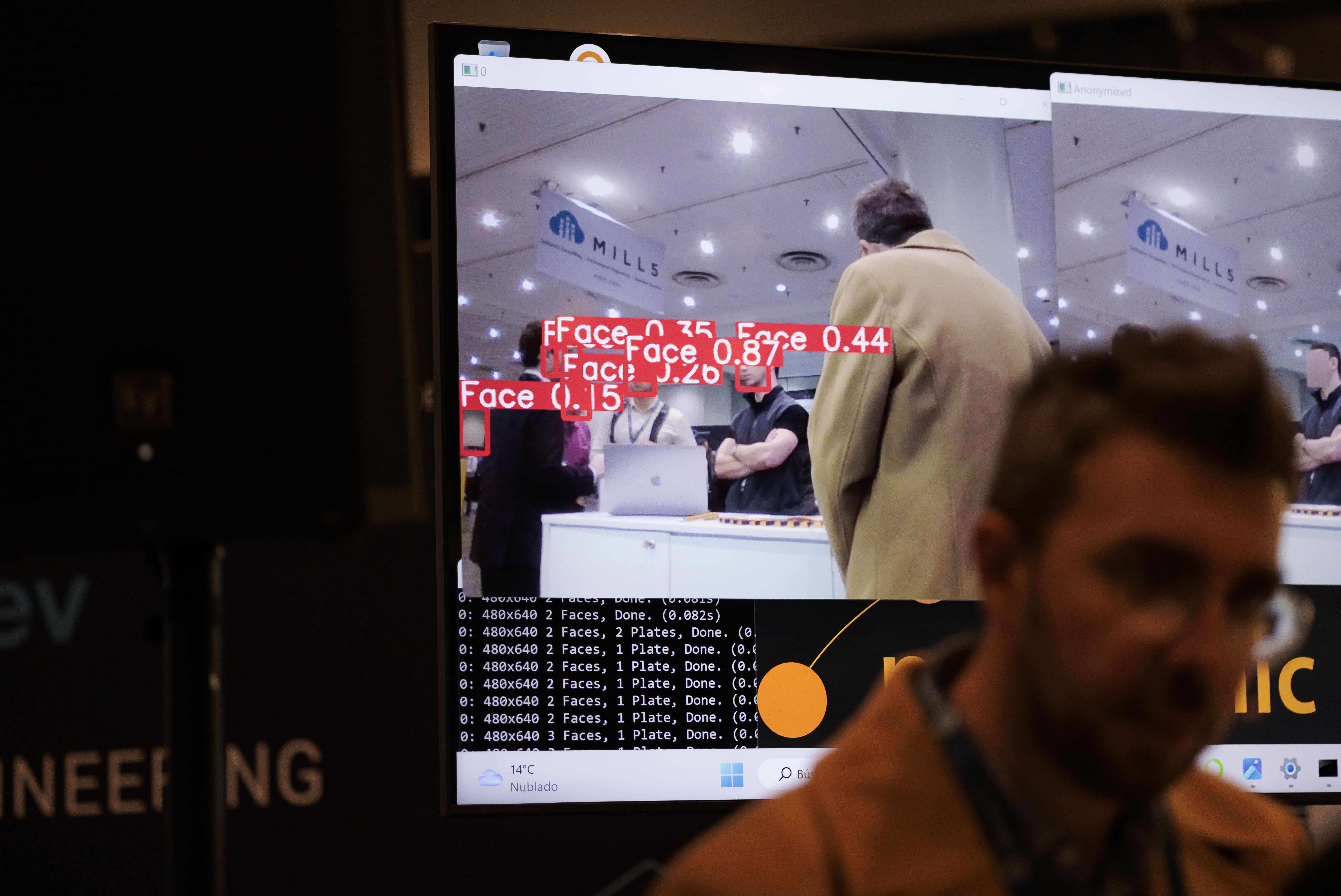
A screen showing facial recognition software as people discuss artificial intelligence technology at the AI Summit New York at the Javits Convention Center, Dec. 7, 2022.
City Councilmembers will also grill agency officials on their use of biometric surveillance at a Wednesday hearing. [ more › ]
Firefighters battled a stubborn four-alarm fire on Tuesday evening in a multi-story catering hall in Brooklyn.
At 7:06 p.m. on May 2, FDNY received a call for an odor of smoke at Paradise Manor, Oneg Caterers at 5802 New Utrecht Ave. in Borough Park. FDNY deployed just over 200 members to the scene, where they encountered heavy fire throughout the building that was extending to neighboring buildings.
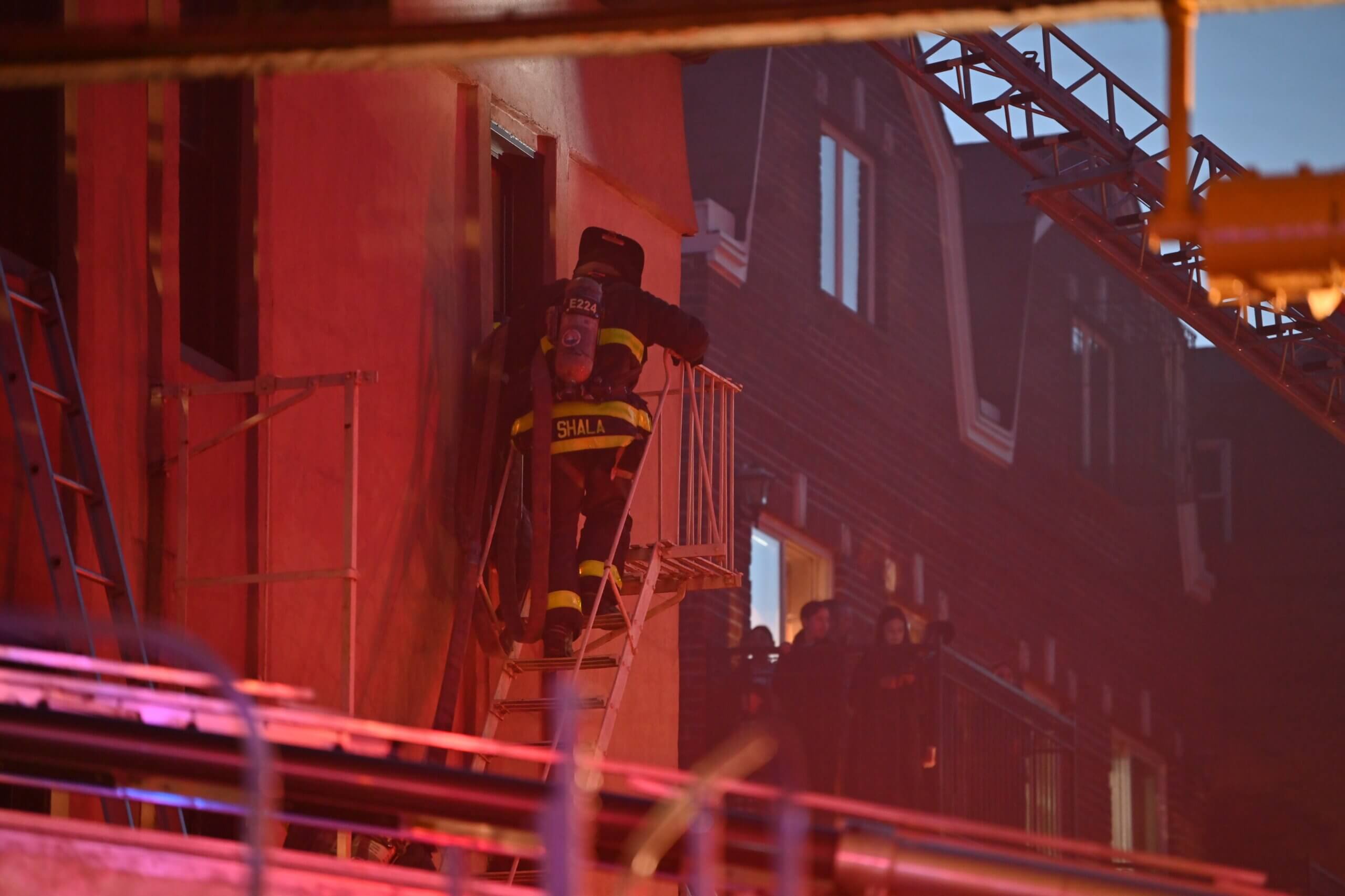 A firefighter works a hose-line during a four alarm.Photo by Lloyd Mitchell
A firefighter works a hose-line during a four alarm.Photo by Lloyd Mitchell 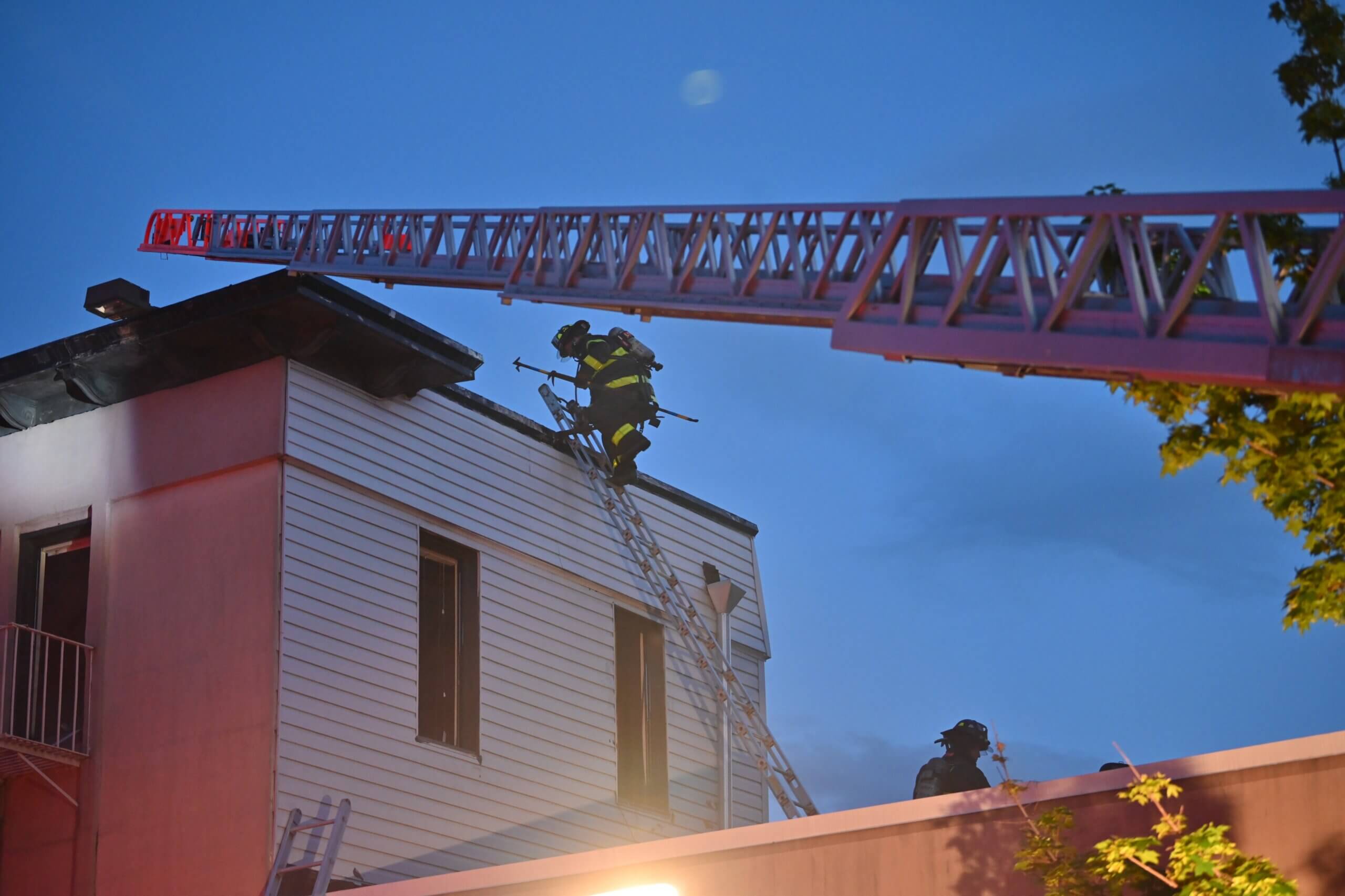 A firefighter cuts a hole while working in a heavy smoke condition during a four alarm fire at Paradise Manor at 5802 New Utrecht Avenue on Tuesday evening.Photo by Lloyd Mitchell
A firefighter cuts a hole while working in a heavy smoke condition during a four alarm fire at Paradise Manor at 5802 New Utrecht Avenue on Tuesday evening.Photo by Lloyd Mitchell
Residents say that the building was used often for weddings and bar mitzvahs. FDNY personnel used six hose lines to knock down the fire, with firefighters describing the building as maze-like inside. The fire was so intense that Fire Department personnel cut three large ventilation holes into the roof of the buildings to ventilate and alleviate the smoke and fire conditions for units operating inside the building.
The fire was placed under control at 9:59 p.m. Searches throughout the building yielded negative results, and no injuries were reported as a result.
The Department of Buildings was called to check the building’s structural stability.
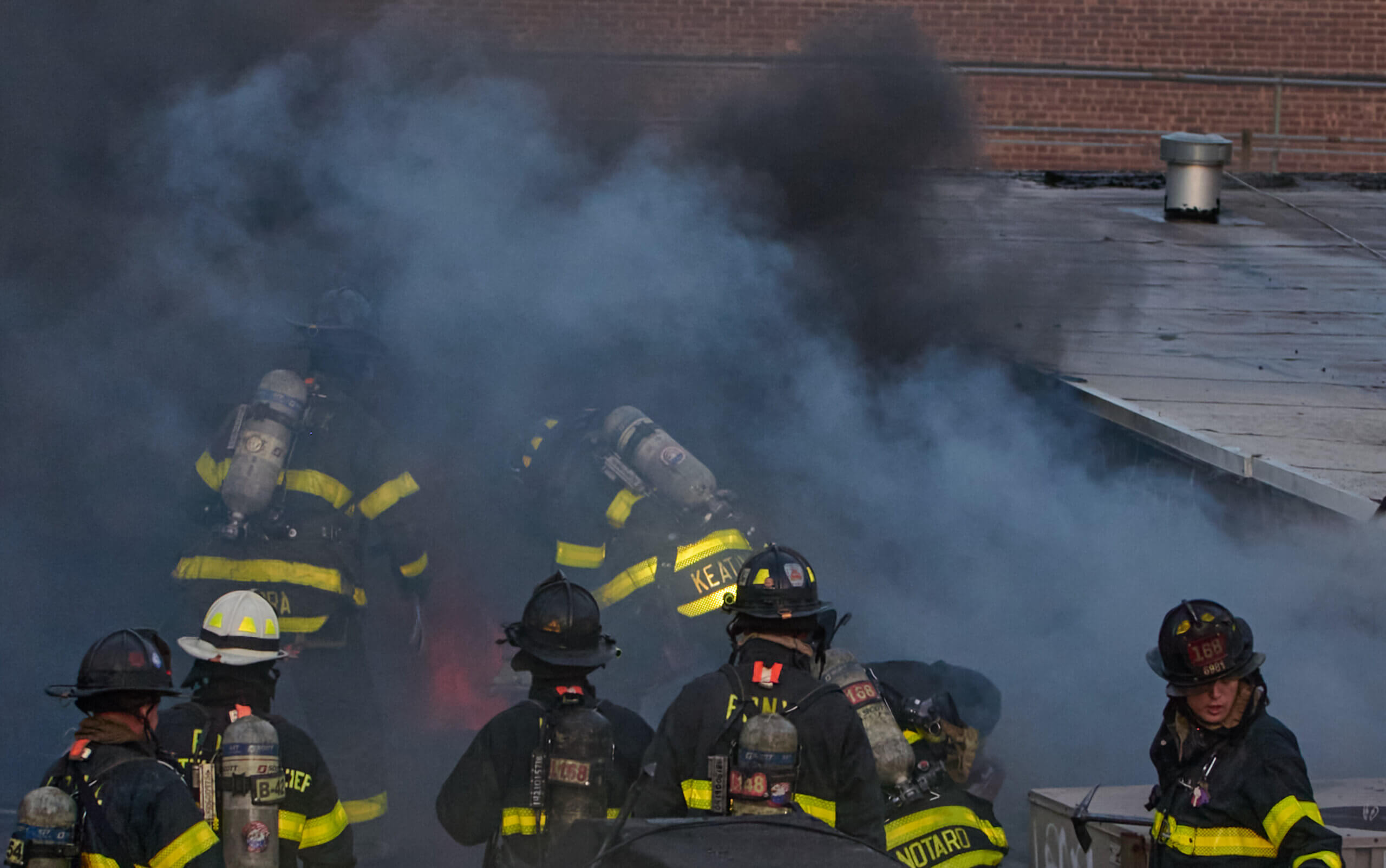 Firefighters work as heavy fire blows through the roof of a two story business on 5802 New Utrecht Avenue.Photo by Lloyd Mitchell
Firefighters work as heavy fire blows through the roof of a two story business on 5802 New Utrecht Avenue.Photo by Lloyd Mitchell 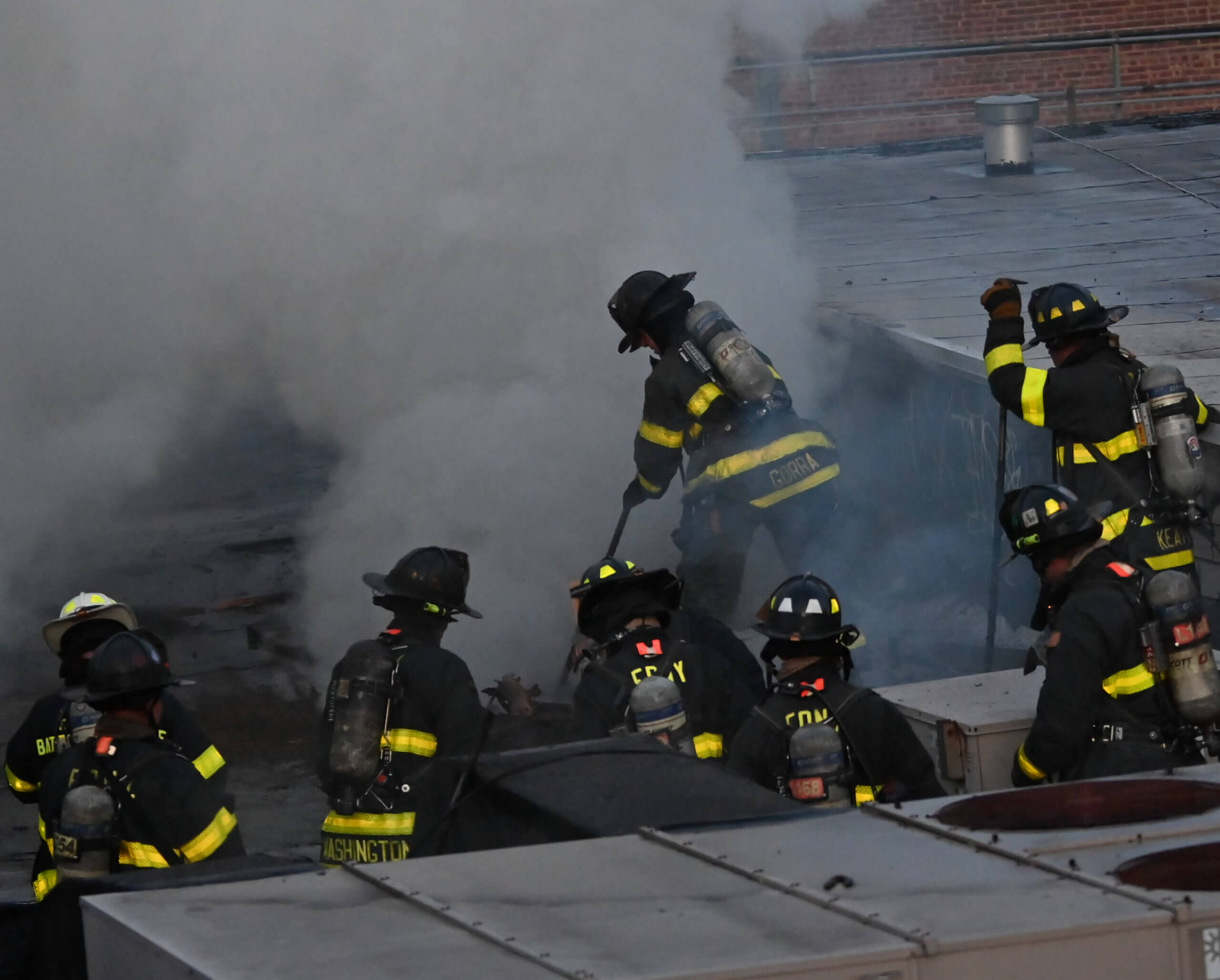 Firefighters look on after cutting a vent hole into the roof of a commerical building at 5802 New Utrechet Avenue.Photo by Lloyd Mitchell
Firefighters look on after cutting a vent hole into the roof of a commerical building at 5802 New Utrechet Avenue.Photo by Lloyd Mitchell 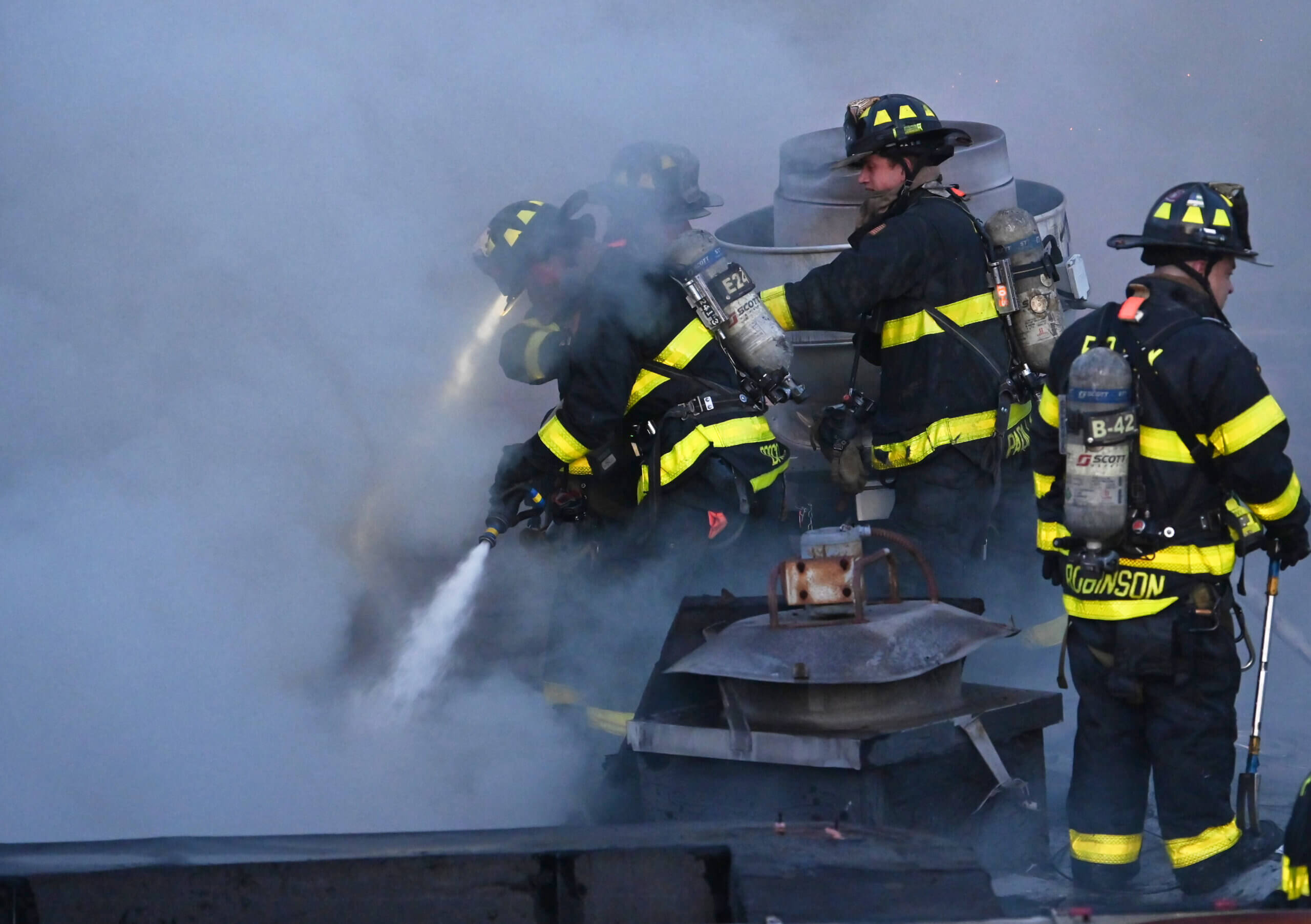 Firefighters operate a hose-line during a four alarm fire at 5802 Utrecht AvenuePhoto by Lloyd Mitchell
Firefighters operate a hose-line during a four alarm fire at 5802 Utrecht AvenuePhoto by Lloyd Mitchell 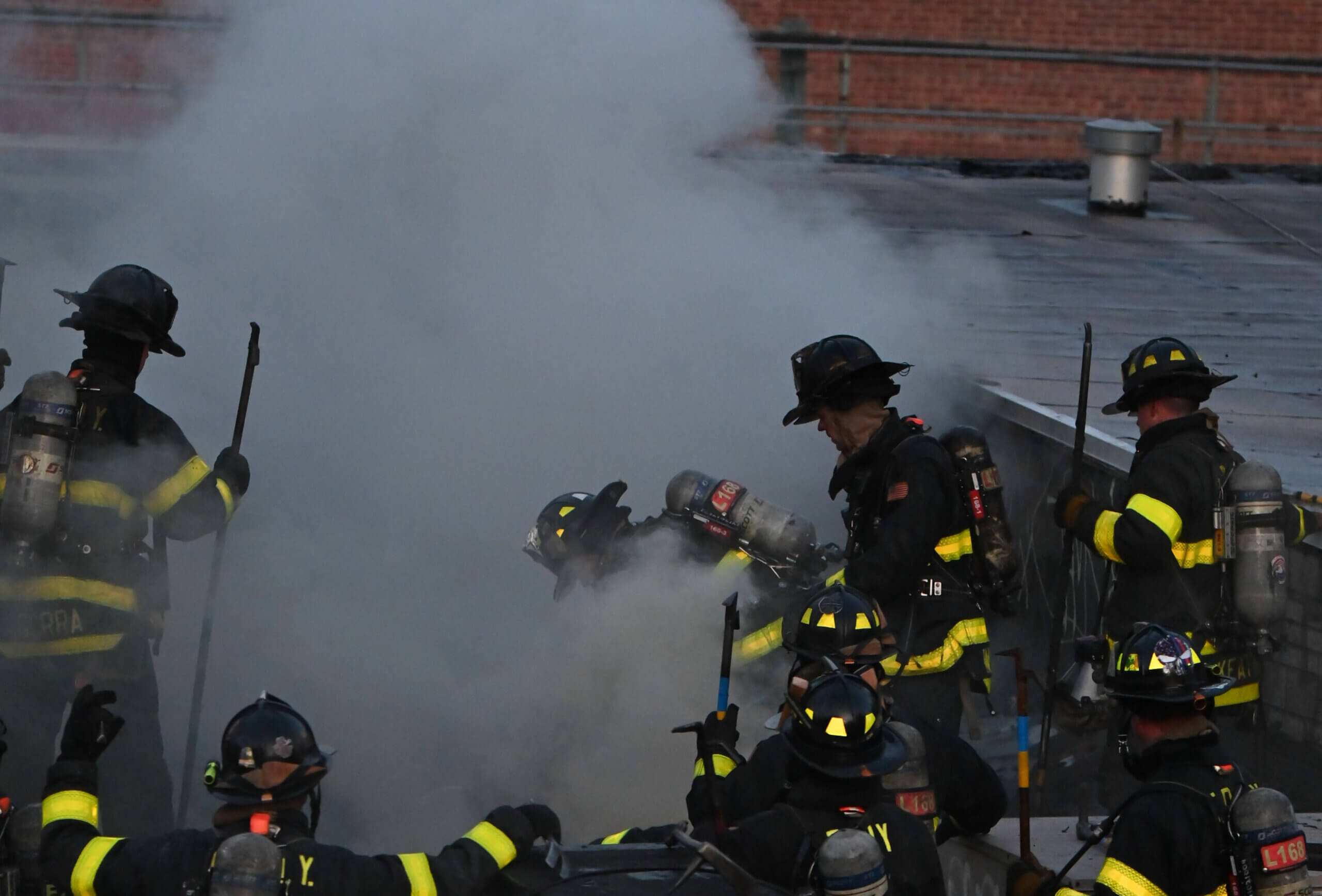 A firefighter cuts a hole while working in a heavy smoke condition during a four alarm fire at Paradise Manor at 5802 New Utrecht Avenue on Tuesday evening.Photo by Lloyd Mitchell
A firefighter cuts a hole while working in a heavy smoke condition during a four alarm fire at Paradise Manor at 5802 New Utrecht Avenue on Tuesday evening.Photo by Lloyd Mitchell
 image/jpeg DSC_7356-1200x800-1-384x256.jpg
image/jpeg DSC_7356-1200x800-1-384x256.jpg image/jpeg 6452519459E6F.jpg
image/jpeg 6452519459E6F.jpgNew York State lawmakers on Tuesday night passed a $229 billion budget a month late, moving to lift the minimum wage, tweak bail laws and implement new pollution-fighting protocols.

A 14-year-old boy unleashed carnage inside the halls of his elite school in the Serbian capital of Belgrade Wednesday morning, fatally shooting eight children and a security guard.

(CNN) – A former FBI supervisory special agent has been arrested on charges related to the U.S. Capitol breach on January 6, 2021. Jared Wise, who was with the FBI For more than a decade, was arrested this week in Oregon. He has not yet entered a formal plea on the four federal crimes he’s […]
The post Ex-FBI supervisor accused of encouraging Jan. 6 mob to ‘kill’ police first appeared on Trumpism And Trump - The News And Times.
The alleged Putin attack comes as Ukraine is expected to launch a significant counteroffensive aimed at liberating territories taken by Russian forces last year.
The post How the Ukraine War Ends: Putin Assassinated (Someone Tried)? appeared first on 19FortyFive.
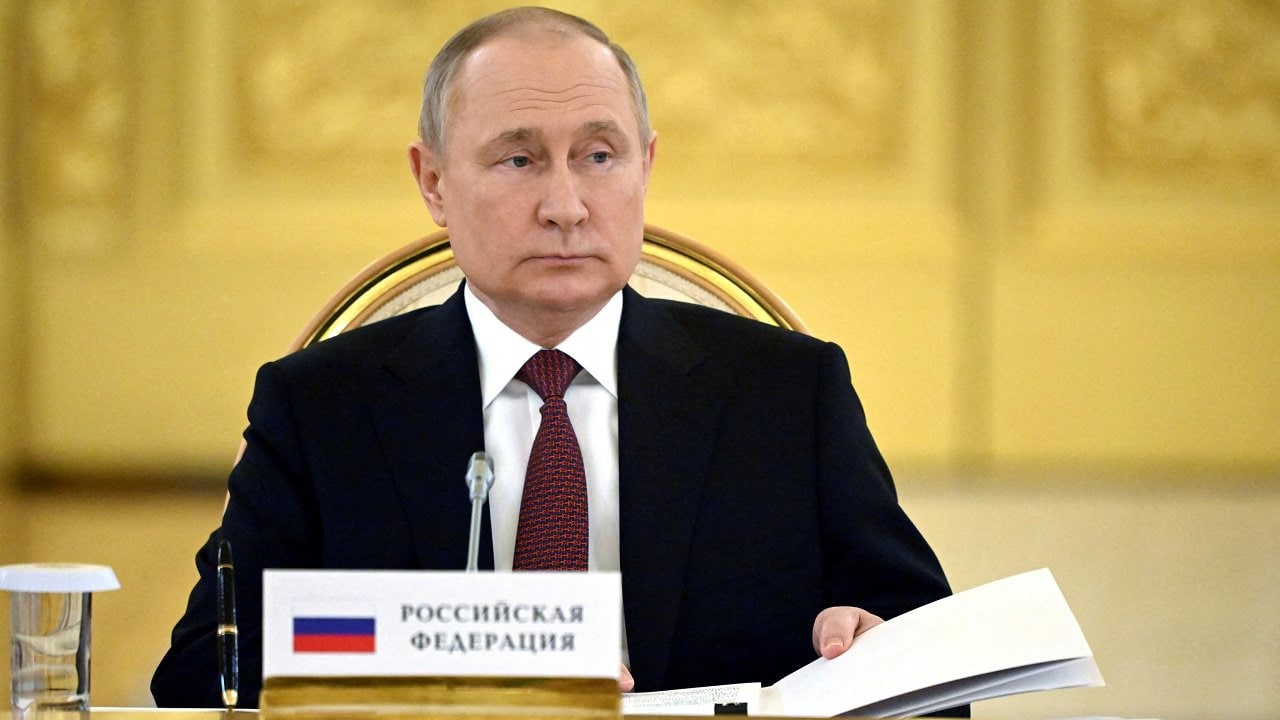
It may or may not be big news that two drones may or may not have been fired at the Kremlin in an attempt to kill Russian President Putin.
The post Did Ukraine Just Try to Assassinate Putin? (Or Did FSB Try To Kill Him?) appeared first on 19FortyFive.
Michael Novakhov retweeted: The Russian Ministry of Defense is reporting that 2 Ukrainian Drones attempted to Target the Residence of President Vladimir Putin last night at around 3am in an apparent “Assassination Attempt” with the Drones claiming to have been Shot Down using Electronic Warfare Systems.
The post Michael Novakhov retweeted: The Russian Ministry of Defense is reporting that 2 Ukrainian Drones attempted to Target the Residence of President Vladimir Putin last night at around 3am in an apparent “Assassination Attempt” with the Drones claiming to have been Shot Down using Electronic Warfare Systems. first appeared on The Shared Links – The News And Times.
Two drones attacked Kremlin – Google Search shar.es/af9zKq
The post Two drones attacked Kremlin – Google Search shar.es/af9zKq first appeared on The Shared Links – The News And Times.
(CNN) – A former FBI supervisory special agent has been arrested on charges related to the U.S. Capitol breach on January 6, 2021. Jared Wise, who was with the FBI For more than a decade, was arrested this week in Oregon. He has not yet entered a formal plea on the four federal crimes he’s […]
The post Ex-FBI supervisor accused of encouraging Jan. 6 mob to ‘kill’ police first appeared on The News Channels - The News And Times.
Comments
Post a Comment